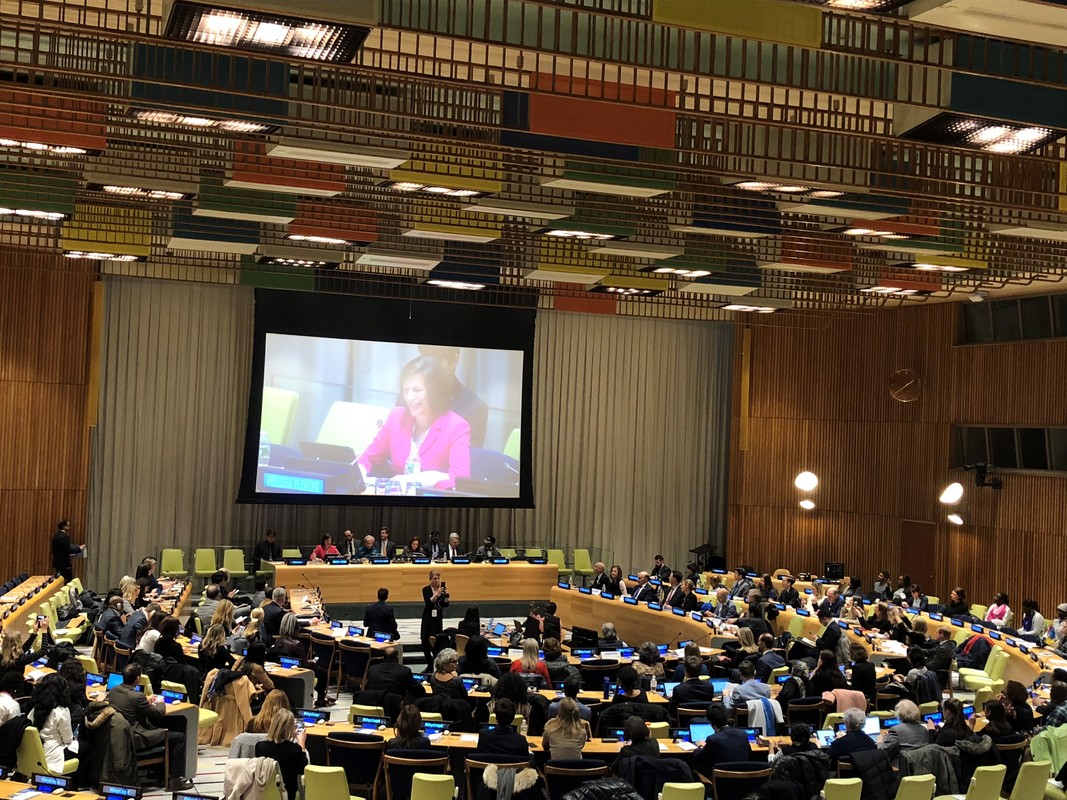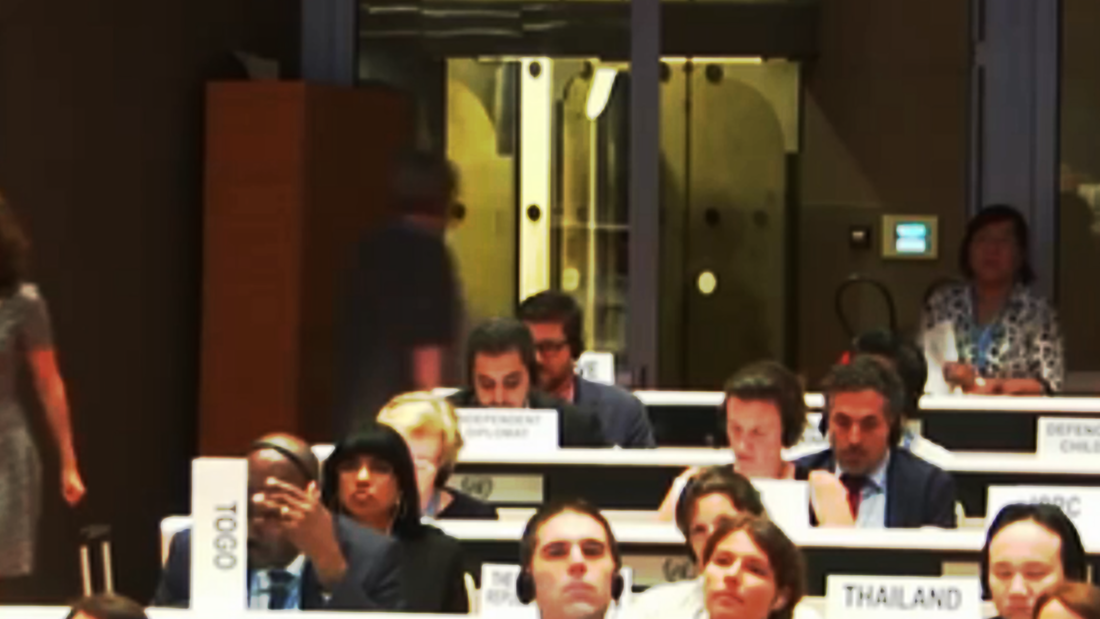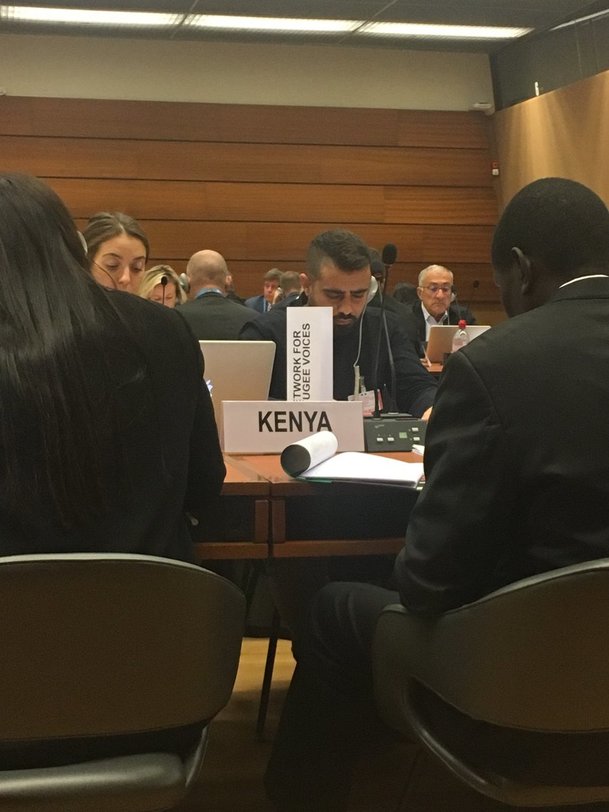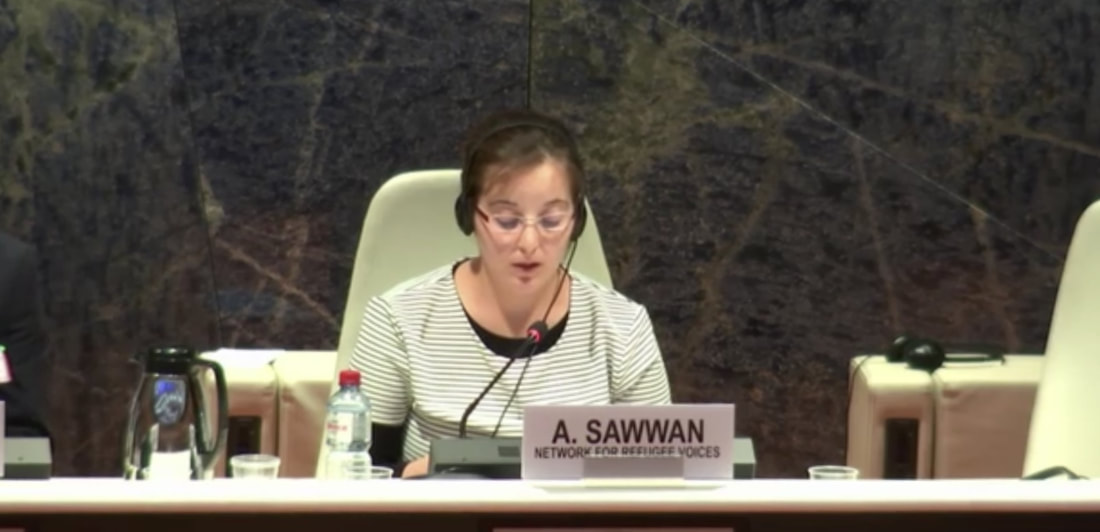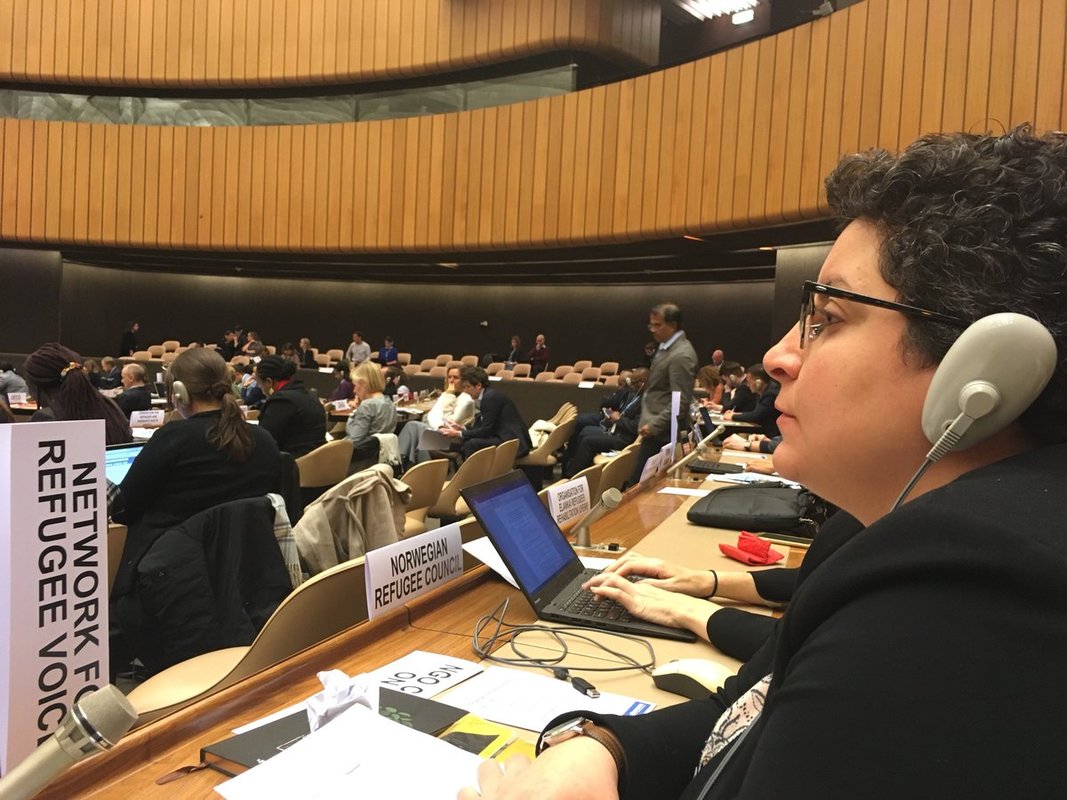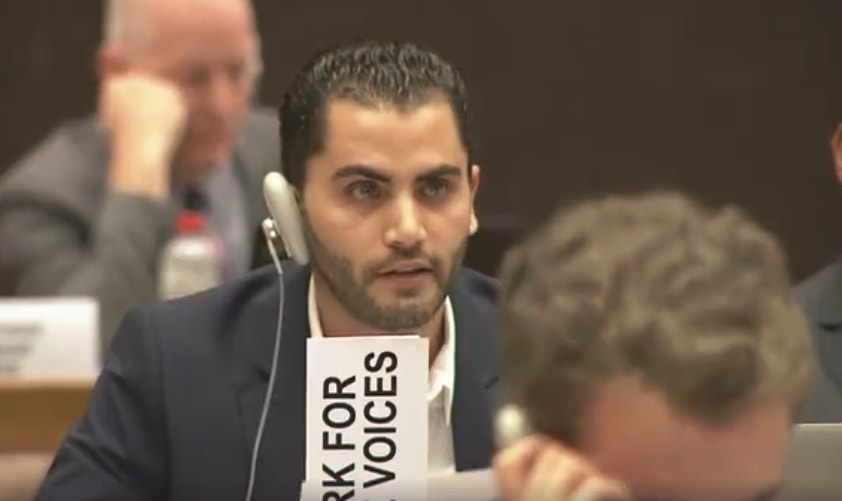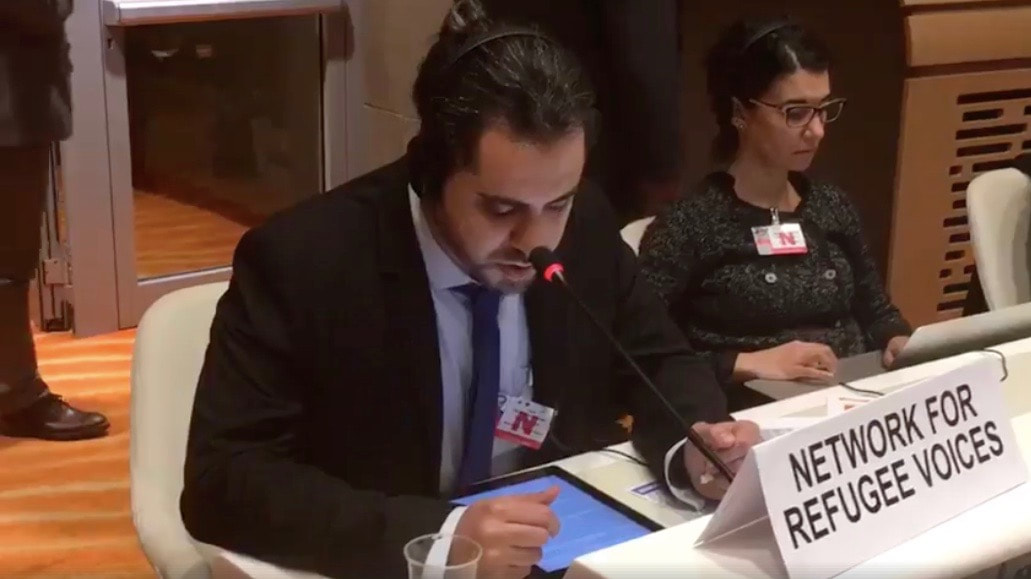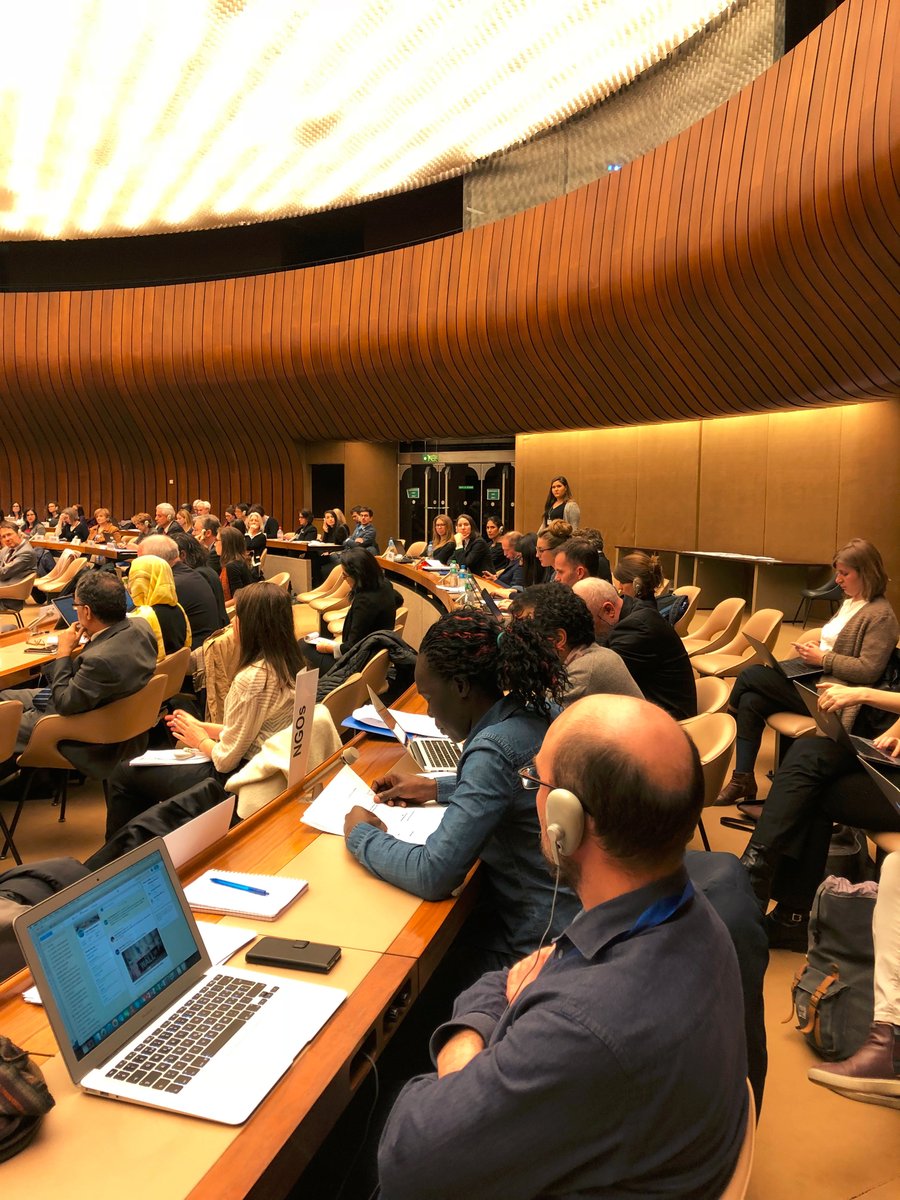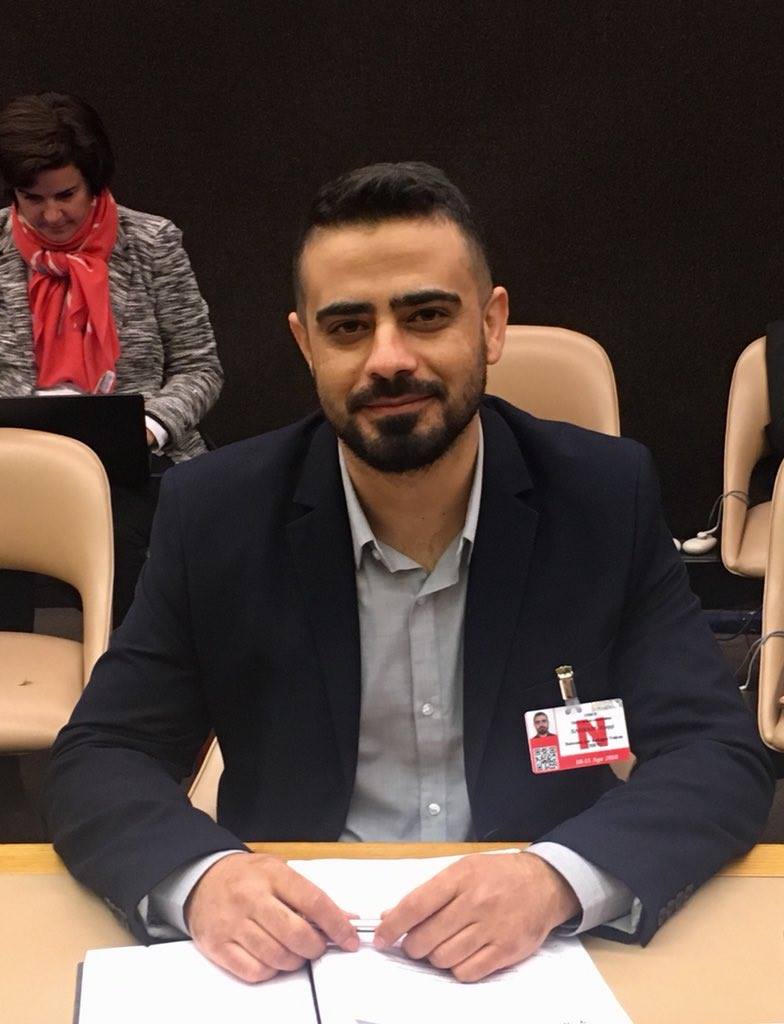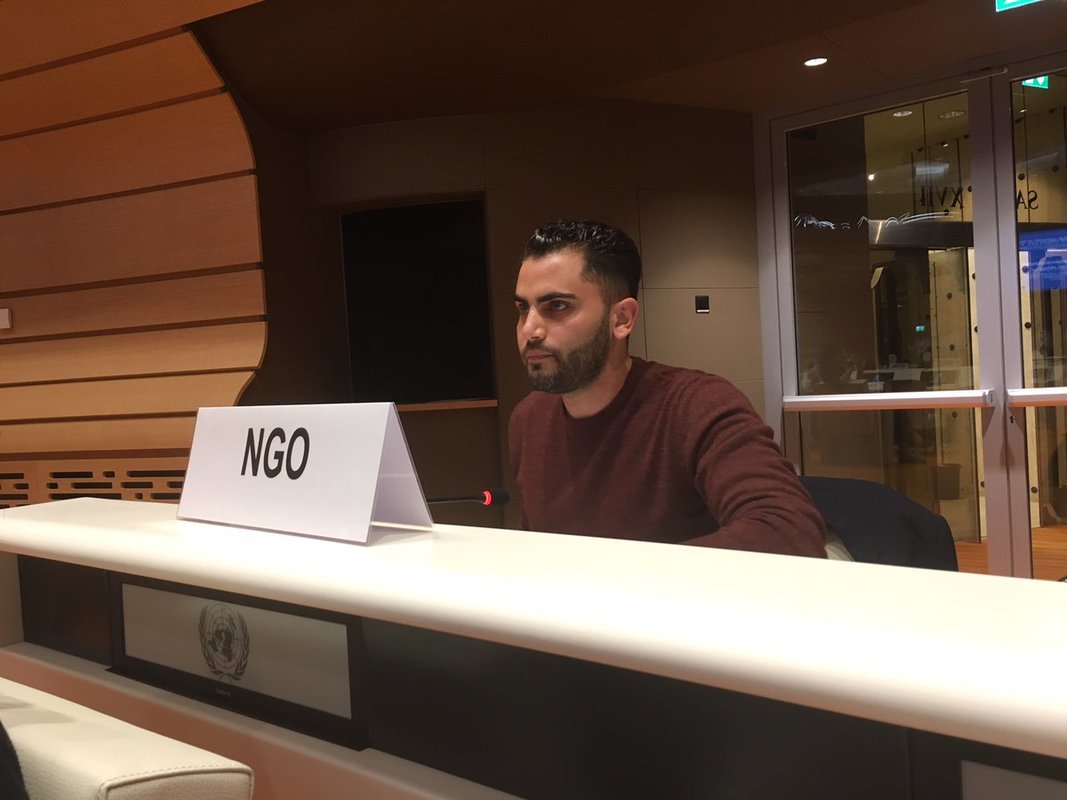|
[NEW YORK, 18 DECEMBER 2018] The Network for Refugee Voices (NRV) welcomes the UN General Assembly’s adoption of the Global Compact on Refugees. Member States and the international community must now implement the Compact’s call to meaningfully engage refugees in its implementation. Two years after the adoption of the New York Declaration for Refugees and Migrants, there are still over 25 million refugees around the world, many of whom continue to seek a dignified life. The commitments made in the GCR must now be converted to action. And action must deliver tangible improvements to the lives of refugees and host communities.
One of the main factors that contributed to the success of the Global Compact process was the engagement of refugees themselves in consultations and negotiations. Refugee voices were included in the thematic discussions of the compact in 2017 and UNHCR gave the Network for Refugee Voices an observer seat in the closed, state-led, formal consultations of the Compact in 2018. Notably, the adopted Compact calls for the meaningful engagement of refugees in its implementation. Yet despite the successful adoption of the Compact, outside the corridors of the United Nations, refugees are still extremely vulnerable and the spirit of international cooperation and solidarity with refugees has yet to be put into action. Over the past two years we have seen: the end of the Aquarius rescue boats; outsourcing of refugee processing to countries with questionable human rights records; host countries and UNHCR calling for refugee return to Syria despite ongoing horrendous persecution; and countries negotiating Rohingya refugees’ return to Myanmar without adequate guarantees and without consultation with the refugees themselves. There is still work to be done. Refugee self-reliance, one of the goals of the Global Compact on Refugees, starts with us, refugees. Over the past two years we have engaged with States, UNHCR, the private sector, municipal governments and NGOs to ensure refugees are part of the solution. As stated in the Compact, “Responses are most effective when they actively and meaningfully engage those they are intended to protect and assist. Relevant actors will, whenever possible, continue to develop and support consultative processes that enable refugees and host community members to assist in designing appropriate, accessible and inclusive responses.” The Global Compact on Refugees offers a new way forward to find better, more effective, and inclusive, solutions to the refugee situation. States, and other stakeholders, must actually act upon the commitments they have made by adopting the GCR and improve the lives of refugees and host communities. The Network for Refugee Voices looks forward to working with the international community to ensure that refugees are at the center of implementing the Global Compact on Refugees, beginning with the 2019 Global Refugee Forum. NRV INTervention - Iyad KallasDear Distinguished Representatives,
Years ago, I left Syria for Europe to seek safety. Since then, not a day has gone by when I have not thought of my loved ones and other fellow Syrians left behind, in dire situations in different countries, deprived of safety, robbed of their futures, and of their voices. These overwhelming thoughts triggered my sense of responsibility to dedicate the past years to empowerment of refugee communities around me. I co-founded a refugee-led organization which engages and serves hundreds of thousand fellow Syrians. Throughout these years, I’ve also met other refugees working to empower our peers, to organize and assume our responsibility to address the global refugee crisis and to engage our host communities. We formed a “Network for Refugee Voices” to remind the world community that refugees have agency and that our contribution is key to develop solutions that are effective and sustainable. Today, we come to appeal to you to not leave us to do this work alone, and we address you with three calls to action:
Hearing me, a refugee voice, in this room, is only a step in the right direction. I hope that we will continue to inform this process with concrete proposals. Thank you! NRV INTERVENTION- HAQQI BAHRAMLadies and Gentlemen, Excellencies,
Like millions of people, I fled from war. I first arrived in Greece where the assistance I received was not safe nor dignified, as I was immediately detained for the only crime of seeking safety. As a result, like many others, I had to take matters into my own hands. I had to flee further and seek my own solutions outside the institutional response. I relied on my fellow refugees, friends I made in my host community, and my agency. Today, I represent a coalition of refugee-led organisations, the Network for Refugee Voices. My colleagues and I work every day to support refugees in our communities. We understand what they are going though and we now have the tools to help. I have experienced firsthand what an effective, safe and dignified response to large movements of refugees looks like. It is a response where refugees are included, and supported, as agents of change. Refugees are best placed to identify vulnerabilities within our communities. Few are a more legitimate stakeholder in dialogue with host communities than we are. Therefore, I believe that the first step to ensure the safe and dignified reception of large numbers of refugees is to involve refugees from the onset of the crisis to help develop the most cost effective and sustainable solutions. These solutions must then be supported by long term strategies that are not just based on a limited assessment of our needs but on a holistic analysis of our aspirations. For the benefit of refugees, as well as that of host communities and donors, I urge you to commit to create space for refugee voices to be heard in the policy discussions that concern them. Thank you. NRV'S AMEENAH SAWWAN AND AMAF YOUSEF PARTICIPATE IN A SIDE EVENT During THE THIRD THEMATIC SESSION OF THE GCR.Side event: Refugee voices – Closing the Refugee Representation Gap
NRV Intervention - Ruham hawashLadies and Gentlemen,
Excellencies, I'm a Palestinian-Syrian refugee living in Germany. My experience in Citizens for Syria has proved to me that refugee led initiatives allow for the creation of local solutions, employment opportunities and to combat xenophobia. My experience has also shown me that refugees are the most legitimate and effective actors in fighting xenophobia. As long as others speak on our behalf, we will not be able to demonstrate our integration, and develop a harmonious relationship with our host communities. All too often, refugees are only seen as recipients of humanitarian aid. Effective solutions can only be made and implemented through building self reliance schemes that involve us. To do this, we need better recognition of refugee skills and qualifications to prevent an inefficient allocation of human capital, in a given labor market. Refugees must be given flexible educational opportunities, as well as greater chances to gain employment through reduced bureaucratic burden. We must also acknowledge the diversity between refugee community, and employ an inter-sectional approach when designing and implementing refugee focused projects. Thank you. NRV Intervention - MOhammed BadranYour Excellencies,
As refugee leaders from NRV, we strongly believe in the ‘whole-of-society approach’. Rather than being dependent on our hosts’ aid and generosity, refugee-led initiatives empower us to take action. The current system creates a cycle of dependency. This cycle limits opportunities for refugees with the agency to succeed, and lift others out of vulnerable situations into self-reliance. Refugee-led initiatives can help to reverse this trend. Throughout my experience in Syrian Volunteers in the Netherlands, a refugee -led organization, refugees can create their own initiatives when they are given the space to do so. Chair, we urge all not to rob refugees of their agency, by keeping them in a situation of dependency. States should take ownership of refugee initiatives and advocate for it. Finally, we remind all, that states took a commitment towards a ‘whole-of-society approach’ in the New York Declaration point 69 which is including us in the consultations. On this basis, we urge you all to continue to uphold this commitment in 2018. Thank you very much. NRV's Iyad Kallas speaking at The UNHCR High Commissioner’s DialogueThank you for giving me the chance to speak on behalf of the Network for Refugee Voices.
My six year old daughter was swallowed by the war. My house was burnt down to the ground. I lost my left leg and with it the ability to provide for my family. I feel stuck with nowhere to go, but if I could I would depart someplace where I could go back to being a hairdresser and tell stories about life and hope. Your Excellencies, This is not my personal story. This was one of many stories that were whispered in my ears while I was wandering around refugee camps in many countries. Albeit agonizing, these stories inspire hope and best practices when they speak of success and they draw attention to red flags when they speak about failure. These stories motivated me along with some of my refugee colleagues to create Souriali, a refugee led media platform to share information about our lives’ experiences, about us as humans, who seek refuge and dignity. Humans who were given a chance or had to fight for one to succeed, or were cornered by despair and dark even radical thoughts, but most importantly of the humans who out of necessity learned first hand about self reliance and burden sharing. Even before the international community decided to label our lives as the century’s crisis. As a Syrian I see these stories as living examples of how we, as refugees, are capable resourceful and self-sufficient when informed, empowered and given agency. We have demonstrated tangible ways to strategize and implement efficient, comprehensive and relevant solutions for our daily challenges. We learnt that self reliance starts organically with us before anyone else, and we learnt that a ‘whole of society approach’ would not be ‘whole’ without our participation in designing, implementing and informing decision makers about a better comprehensive refugee response. We’ve learnt that our stories hold valuable information in them, and that we are not only victims of the crisis, but also a vital part of the solution, and should be at the center of policy making. That is the reason why some of us came together last March to form the Network for Refugee Voices, with the aim to bridge the gap between ‘you’ and ‘us’, and to inform this process with lessons and practices that we and our close ones had first hand experience with. Encouraged by this motive, we have circulated recently some of these lessons and recommendations in the form of a green paper. As we highlighted in our non paper and as stressed by Mr. High Commissioner, and many voices from today’s sessions, we are calling on you to ensure that refugees have a seat at the tables next year during the conversations to draft the Global Compact on Refugees and its programme of action. This participation should be genuine, meaningful and effective and beyond formalities, as it is a key element to sustainable and successful outcomes for all stakeholders, including ‘you’ and ‘us’. We have a lot to offer, and in our minds that question is not what you can do for us, but it is what can we do together. Thank you so much. NRV Member Ninah Amalo delivered the collective NGO intervention at the First Formal Consultation on the Global Compact on Refugees. Dear Chairperson, distinguished delegates, This intervention has been drafted following wide consultations with NGOs. We recognise UNHCR’s efforts towards the adoption of a Global Compact on Refugees, and appreciate the sustained engagement with the NGO community. We welcome the zero draft of the Programme of Action, a vital part of the Compact, and the opportunity to offer feedback. To start with general comments, we share the view that the Compact’s success will be determined by concrete improvements in the lives of refugees, stateless persons and host communities. To do so, the Compact will need to transform the international community’s approach to protection, assistance and durable solutions for refugees. The Programme of Action should therefore be realistic, but also put forward collective ambitions and objectives. The Programme of Action’s commitment to the refugee protection regime is reassuring. We nevertheless expected stronger references to agreed normative frameworks, particularly to nonrefoulement, the core of refugee protection. The text also needs stronger references to essential human rights standards, including women and child rights, access to justice and proposed actions to prevent and resolve statelessness. We appreciate that the zero draft underlines the need for predictable and equitable responsibility sharing, but we reaffirm that the word ‘burden’ does not reflect the opportunities and benefits refugees can generate. Moreover, we note that explicit reference to resettlement is missing from this part of the text, thus putting emphasis mainly on financial dimensions. We strongly believe that responsibility sharing should be a collective effort, exercised not just by interested States or those closest to humanitarian crises. Going more in details, a timeline for responsibility-sharing arrangements should be provided, starting with immediate measures that States could take, and build upon those to achieve longterm objectives. The international community must also affirm its obligation to address the root causes of displacement. We also recognise efforts to build on the Sustainable Development Goals. To ‘leave no one behind’, refugees and persons of concern have to be included in national development plans. But we must also acknowledge that humanitarian assistance and principles will not always line up with national development strategies and emergency assistance must be prioritised when refugees and stateless persons are in urgent need of relief. Read the full text here. NRV Member Haqqi Braham delivered the second collective NGO intervention at the Third Formal Consultation on the Global Compact on Refugees. Dear Chairperson, This intervention has been drafted through wide consultations with NGOs. First, we commend progress made, including the new focus on food security and statelessness. We also appreciate the emphasis on harnessing refugees’ potential while moving beyond encampment policies. In short, this section may allow better fulfillment of refugees’ rights, including their social and cultural rights. In this perspective, supporting national systems is crucial but it must lead to comprehensive inclusion of refugees. Related measures should also be accompanied by stronger references to freedom of movement for refugees and we repeat that investing in refugees’ skills better prepares them for all durable solutions, not just returns. In addition, although stronger complementarities between emergency response and development cooperation may yield positive results, we recall that humanitarian assistance must remain needs-based, accountable to refugees and principled in line with international humanitarian law. On education, we stress the need for inclusive approaches and welcome the reference to ‘safe schools’, which could also mention removing safety-related or practical obstacles to attendance. Moreover, expanding access for refugees will require supporting inclusive national education systems and long-term planning through predictable funding. Emphasis must be put on universally recognised quality education, which facilitates complementary pathways. Access to education for children and youth living with disabilities must also receive special attention. We welcome the emphasis on access to jobs and livelihoods and encourage support for professional development, entrepreneurship, and skills retention, which contribute to durable solutions. Access to productive, safe and equitable work opportunities must be accompanied with strong and enforceable protection safeguards to prevent exploitation. The Compact should include explicit references to both States’ ‘duty to protect’ and business’ ‘responsibility to respect’ labour and human rights. Refugees must be made aware of their rights and have access to social protection. Read the full text here. NRV Member Mohammed Badran delivered the fifth collective NGO intervention at the Fourth Formal Consultations on the Global Compact on Refugees. Dear Chairperson, This intervention reflects a diversity of views among NGOs. Overall, NGOs acknowledge that the Solutions section now better integrates gender concerns although AGD considerations could also be strengthened. Attempts to link this section to responsibility-sharing mechanisms are positive. We particularly welcome proposals on pledges towards resettlement and pathways and calls to support local integration. More specifically, we are encouraged to see non-refoulement added in relation to voluntary repatriation. We also appreciate the new language underscoring that voluntary repatriation is the preferred solution in the ‘majority of refugee situations’, not primarily of all refugees. However, we remain concerned by the assertion that “voluntary repatriation is not necessarily conditioned on the accomplishment of political solutions in the country of origin”. Incentives and penalties are sometimes used to coerce refugees’ consent to return, often leading to added instability in countries of origin and further displacement. Voluntary repatriation is also predicated on child-friendly, gender- and disabilityresponsive information-sharing on protection risks, helping informed decision-making. Finally, we suggest adding details on tripartite agreements to ensure this tool is updated to bring additonalities. In situations where refugees freely chose to return, support for countries of origin is vital. We welcome invitation for peacebuilding, development and humanitarian support. We underline, however, that in countries of origin, humanitarian actors often face tremendous access constraints. As such, there is an urgent need to ensure unfettered access for humanitarian actors; increase unearmarked and multiyear humanitarian funding; and to underline the ‘do no harm’ principle. When providing support to countries of origin, it is vital to respect and increase local capacities. Read the full text here. |

